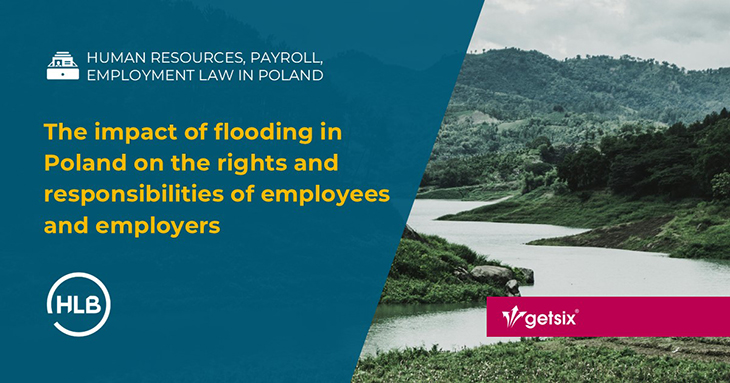The impact of flooding in Poland on the rights and responsibilities of employees and employers
Below is a brief summary of legal provisions that apply or may apply in the event of flooding:
Absence from work due to flooding
The general rule is that if circumstances arise that prevent an employee from coming to work (and flooding is such a circumstance), the employee is required to notify the employer of the reason for his absence.
The employee should inform the employer not later than the second day of his absence. If the employee is unable to inform the employer for reasons beyond his control, no legal consequences should be taken against the employee.
Flooding constitutes a justified reason for an employee’s absence from work.
Leave for volunteer firefighters during rescue operations
Employers are obliged to release an employee who is a member of the volunteer fire brigade for the time necessary to participate in rescue operations and for the required rest period after the operations finished.
A volunteer firfighter participating in a rescue operation is entitled to a financial equivalent for his proper participation.
However, he does not command the right to retain his regular salary during his absence from work.
Leave from work due to force majeure
Employees affected by flooding are entitled to leave of up to 2 days or 16 hours due to force majeure in urgent family matters caused by illness or accident, where the employee’s immediate presence is necessary.
During this leave, the employee retains the right to 50% of his salary.
The request can be made orally or in writing, even on the day of the flood itself. The employer must grant the leave at the terms set forth by the employee.
Emergency leave
In connection with flooding, an employee may also request emergency leave, but not more than 4 days in any calendar year.
Remote work
Remote work can be enforced by the employer:
- During a state of emergency (such as a declared natural disaster), an epidemic threat, or an epidemic, as well as for 3 months after such a state is lifted, or
- When the employer cannot temporarily ensure safe and hygienic working conditions due to force majeure at the current working place of the employee.
Remote work on the employer’s order requires confirmation from the employee that he masters suitable conditions for remote work and that the conditions outlined in the labour code are met.
Childcare
In the event of the unforeseen closure of a nursery, preschool, or other childcare facility, a parent or guardian of a child under 8 years old may apply for a childcare allowance.
Leave for childcare
An employee raising at least one child under the age of 14 is entitled to 16 hours or 2 days of paid leave per calendar year.
Compensation for work suspension
If a workplace is non-operational due to flooding, the employer is obligated to pay idle-time compensation.
An employee who is ready to work but is unable to do so due to reasons attributable to the employer is entitled to compensation based on his hourly or monthly wage, or, if this is not specified in the work regulations, 60% of his salary.
In any case, the compensation cannot be lower than the statutory minimum wage as set forth in separate legal regulations.
Unpaid Leave
An employee who has used all entitlements available in the case of flooding can also request unpaid leave. Granting such leave is at the sole discretion of the employer.
Special flood relief law on removal of flooding damages (law)
According to Article 8 of the law on special provisions related to flood damage relief, the inability to work due to flooding gives ground for justifying an employee’s absence.
For the time of justified absence due to flooding, the employee is entitled to a portion of the minimum wage, as specified by separate regulations, for no more than 10 working days based on the employee’s work schedule.
If the employee is entitled to compensation under another provision (e.g., force majeure, childcare), the minimum wage claim does not apply.
The employer may assign the employee to perform work different from that specified in his employment contract if necessary to mitigate the effects of the flood at the workplace. In such case, the employee retains the right to his agreed salary, calculated according to the rules for vacation pay.
Under Article 10 of the law, Social Fund (ZFŚS) resources may be allocated to aid employees affected by flooding, whether employed by the employer managing the fund or a third party employer. The application of Article 10 is valid until December 31, 2024.
 Source: The article was created in collaboration with our cooperation partner – SDZLEGAL Schindhelm Law Office
Source: The article was created in collaboration with our cooperation partner – SDZLEGAL Schindhelm Law Office
If you have any questions regarding this topic or if you are in need for any additional information – please do not hesitate to contact us:
CUSTOMER RELATIONSHIPS DEPARTMENT

ELŻBIETA NARON
Head of Customer Relationships
Department / Senior Manager
getsix® Group
***





